

News-paradigm-add. For News Organizations, Transparency is the New Objectivity. Back in the spring, I made an analogy about journalism being a game of chess.
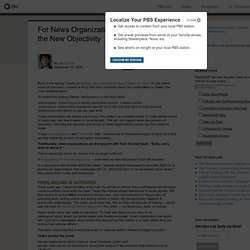
On the chess board of journalism, content is King (the most important piece) but collaboration is Queen (the most powerful piece). To extend the analogy further: transparency is the board itself. Unfortunately, freelancing is a horribly antiquated system. It works behind closed doors. Independent freelancers are left out in the cold and have to build personal relationships with editors to get any paid work. These relationships are always one-to-one. The Creed of Objectivity Killed the News. Reporters who witness the worst of human suffering and return to newsrooms angry see their compassion washed out or severely muted by the layers of editors who stand between the reporter and the reader.
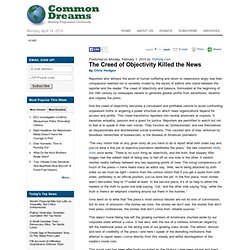
The creed of objectivity and balance, formulated at the beginning of the 19th century by newspaper owners to generate greater profits from advertisers, disarms and cripples the press. And the creed of objectivity becomes a convenient and profitable vehicle to avoid confronting unpleasant truths or angering a power structure on which news organizations depend for access and profits. This creed transforms reporters into neutral observers or voyeurs. Journalists Actually Need Less Objectivity. Journalists actually need less objectivity Robert Jensen Department of Journalism University of Texas Austin, TX 78712 work: (512) 471-1990 fax: (512) 471-7979 rjensen@uts.cc.utexas.edu copyright Robert Jensen, 2000 Newsday, October 11, 2000. p.
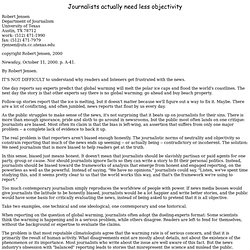
A-41. By Robert Jensen. IT'S NOT DIFFICULT to understand why readers and listeners get frustrated with the news. One day reports say experts predict that global warming will melt the polar ice caps and flood the world's coastlines. Follow-up stories report that the ice is melting, but it doesn't matter because we'll figure out a way to fix it. As the public struggles to make sense of the news, it's not surprising that it beats up on journalists for their sins. The real problem is that reporters aren't biased enough honestly. In this sense, biased just means honest. Too much contemporary journalism simply reproduces the worldview of people with power.
Take two examples, one technical and one ideological; one contemporary and one historical. Journalism Ethics: Objectivity. In the chapter for last week, Merrill discussed all the ways that journalists can, inadvertently or deliberately, become propagandists -- the opposite of objective observers and reporters.
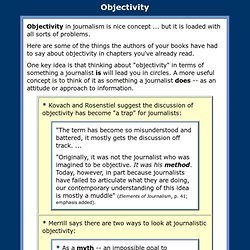
In this week's chapter on general semantics, he says that close attention to the use of language is one way journalists (and everyone else, too) can come as close as humanly possible to truthful communication. An Argument Why Journalists Should Not Abandon Objectivity. In “Losing the News: The Future of the News that Feeds Democracy,” published by Oxford University Press, Alex S.
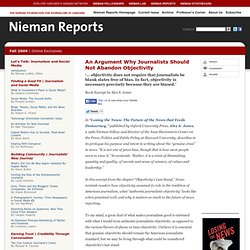
Jones, a 1982 Nieman Fellow and director of the Joan Shorenstein Center on the Press, Politics and Public Policy at Harvard University, describes in its prologue his purpose and intent in writing about the “genuine crisis” in news. “It is not one of press bias, though that is how most people seem to view it,” he contends. “Rather, it is a crisis of diminishing quantity and quality, of morale and sense of mission, of values and leadership.” In this excerpt from the chapter “Objectivity’s Last Stand,” Jones reminds readers how objectivity assumed its role in the tradition of American journalism, what “authentic journalistic objectivity” looks like when practiced well, and why it matters so much to the future of news reporting.
I define journalistic objectivity as a genuine effort to be an honest broker when it comes to news. But what, exactly, was objective journalism? James Moore: WikiLeaks and the Myth of Journalistic Objectivity. "Journalism can never be silent: that is its greatest virtue and its greatest fault.
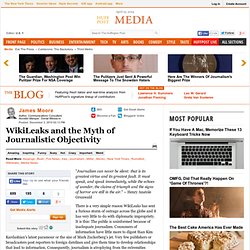
It must speak, and speak immediately, while the echoes of wonder, the claims of triumph and the signs of horror are still in the air. " ~ Henry Anatole Grunwald There is a very simple reason WikiLeaks has sent a furious storm of outrage across the globe and it has very little to do with diplomatic impropriety. It is this: The public is uninformed because of inadequate journalism. Consumers of information have little more to digest than Kim Kardashian's latest paramour or the size of Mark Zuckerberg's jet. Very few publishers or broadcasters post reporters to foreign datelines and give them time to develop relationships that lead to information.
Objectivity has changed – why hasn’t journalism? The following is cross-posted from a guest post I wrote for Wannabe Hacks.
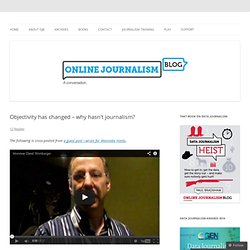
Objectivity is one of the key pillars of journalistic identity: it is one of the ways in which we identify ourselves as a profession. But for the past decade it has been subject to increasing criticism from those (and I include myself here) who suggest that sustaining the appearance of objectivity is unfeasible and unsustainable, and that transparency is a much more realistic aim. Recently I’ve been revisiting some of the research on journalistic objectivity for my inaugural lecture at City University. But as I only mention objectivity once in that lecture, I thought it was worth fleshing out the issue further. Things change. Objectivity (journalism) Journalistic objectivity is a significant principle of journalistic professionalism.
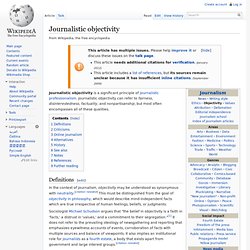
Journalistic objectivity can refer to fairness, disinterestedness, factuality, and nonpartisanship, but most often encompasses all of these qualities. Definitions[edit] Sociologist Michael Schudson argues that "the belief in objectivity is a faith in 'facts,' a distrust in 'values,' and a commitment to their segregation. TV News: Covering the Big Story. There’s something about being on-scene for a major news event that never fails to boost my energy.
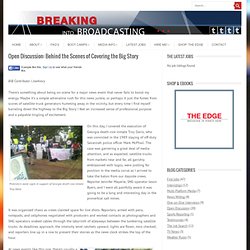
Maybe it’s a simple adrenaline rush for this news junkie, or perhaps it just the fumes from scores of satellite truck generators humming away in the vicinity, but every time I find myself barreling down the highway to the Big Story I feel an increased sense of professional purpose and a palpable tingling of excitement.
Protesters wave signs in support of Georgia death row inmate Troy Davis On this day, I covered the execution of Georgia death-row inmate Troy Davis, who was convicted in the 1989 slaying of off-duty Savannah police officer Mark McPhail. The case was garnering a great deal of media attention, and as expected, satellite trucks from markets near and far, all garishly emblazoned with logos, were jostling for position in the media corral as I arrived to take the baton from our dayside crews. It was organized chaos as crews claimed space for live shots.
Bring food. Network. Pause. SPJ Code of Ethics. SPJ Code of Ethics Revised September 6, 2014 at 4:49 p.m.
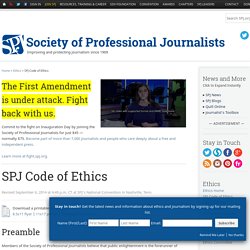
CT at SPJ’s National Convention in Nashville, Tenn. The Myth of Objectivity in Journalism. By This page has been accessed since 29 May 1996. The oft-stated and highly desired goal of modern journalism is objectivity, the detached and unprejudiced gathering and dissemination of news and information. Such objectivity can allow people to arrive at decisions about the world and events occurring in it without the journalist's subjective views influencing the acceptance or rejection of information.
Few whose aim is a populace making decisions based on facts rather than prejudice or superstition would argue with such a goal. It's a pity that such a goal is impossible to achieve. Perhaps a good place to begin would be with a definition of terms. Let's begin with an examination of how people gather information about the world around them in order to arrive at what they consider an objective view of it. The brain has no actual, physical contact with the world. People, like all other sensate beings on Earth, gather their information through their senses.